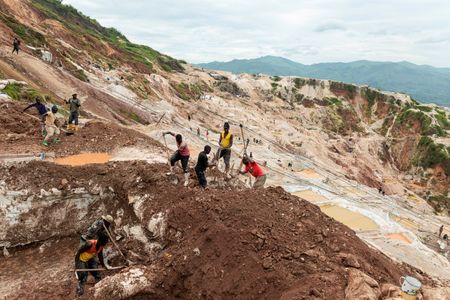By Felix Njini
CAPE TOWN (Reuters) – A new mining law in Mali that raises taxes and seeks to hand over big stakes in assets to the state and local investors will need to be loosened up if gold companies are to invest in new projects there, company CEOs told Reuters.
The new rules compel companies operating in Africa’s second biggest gold producer to divest a 35% share of new projects to Malian investors – up from 20% previously – and raise royalty taxes to 10.5% from around 6%.
Speaking on the sidelines of the annual African Mining Indaba in Cape Town, three gold mining CEOs with operations in West Africa said the new rules make it uneconomic to invest in new mines or buy operations in the country.
Gold, which accounted for 80% of Mali’s exports in 2023, has hit successive record highs over the past year, but the state’s interest and the higher royalty tax are “too much to encourage investment”, one gold mining CEO told Reuters.
“From my conversations with some in the government, there is a growing realisation that the mining code is too harsh, they need to loosen some of the royalty (tax) requirements,” he said.
“The danger is that, as the taxes become too high and hurt the level of investment in the country, as gold companies, because we have choices, we can take our money elsewhere,” a second CEO said.
Mali’s junta-led government has proved aggressive in implementing the new rules, souring relations with top investors, including world no. 2 gold miner Barrick Gold.
Barrick shuttered its Loulo-Gounkoto operation last month after authorities seized its gold reserves by helicopter and arrested several of its employees in a dispute related to the new mining law.
On top of a series of executive arrests and the potential loss of some $245 million in bullion, Barrick CEO Mark Bristow also faces an arrest warrant in Mali.
Mali’s mines ministry declined to comment. It said when the review of the previous code was announced in 2023 that an internal audit had shown it was not receiving a fair slice of profits from the mining sector while granting too many tax breaks.
‘WE ARE TALKING’
Jorge Ganoza, the CEO for Fortuna Mining Corp, a Canadian miner seeking to expand in West Africa, said he would not consider Mali as a potential destination for investment. He said he expects producers’ focus to shift to rich deposits in Guinea, Ivory Coast, Senegal and Burkina Faso.
The lack of investment in new mines and exploration activities could shorten the lifespan of existing mines in Mali, he said. “Do you think Resolute or Barrick today is looking to expand investments in the country? No,” Ganoza said.
Resolute Mining, whose CEO was arrested by Mali authorities last year due to disagreements over the mining rules, said on Jan. 30 the royalty tax will add about $250 per ounce of gold to the all-in sustaining costs of its Syama mine in the country.
The CEOs, who spoke to Reuters separately, cited another Canadian miner, Robex, as an example of a company looking to pull out of Mali. Robex, which is struggling to find buyers for its Nampala mine in the country, said on its website it was shifting focus to Guinea.
Still, some mining groups are continuing to talk to Mali’s junta on how they can keep working in the country.
Resolute, which agreed to pay $160 million for the release of its CEO and senior executives who had been arrested in Bamako last year, said it was continuing discussions on the long-term future of its mine in the country and migration of its assets to the new code.
Barrick CEO Bristow told mining investors in Cape Town on Monday that it had some “challenges” in Mali because of “certain individuals that… promised more to the junta-led transitional government”.
But, he said, “the important thing is, we are talking”.
(Reporting by Felix Njini; Additional reporting by Wendell Roelf; Editing by Jan Harvey)











